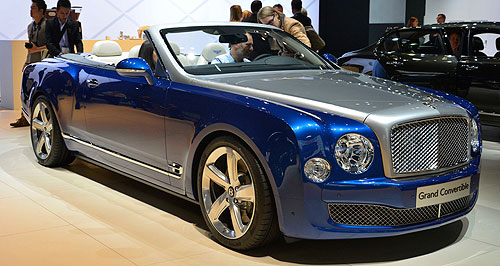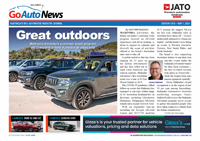Make / Model Search
News - General News - RegulationProposed import rules split the industryNot happy: FCAI chief executive Tony Weber said if the changes to the Act pass, consumers might buy a car that is not well suited to Australian conditions. Major industry bodies are torn over new vehicle import changes16 Apr 2015 By IAN PORTER THE automotive sector has been split by the proposed changes to personal importing rules mooted today by the assistant minister for infrastructure and regional development, Jamie Briggs. Speaking at the opening of the Australian Auto Aftermarket Expo in Melbourne, Mr Briggs said he would recommend relaxing new car import rules to allow individuals to bring in new cars purchased from overseas dealers. He also said he favored relaxing the rules around the importing of collectable or enthusiasts’ cars, but would not recommend the importing of used cars en masse, like in New Zealand. The Federal Chamber of Automotive Industries (FCAI), which represents local and offshore car-makers, dismissed the proposed relaxation as “irresponsible and short-sighted”. FCAI chief executive Tony Weber said personal importing of new cars would deprive buyers of their consumer rights and leave them in “high-risk” situations outside established dealer networks. “Currently, consumers are offered the highest possible level of consumer protection when it comes to purchasing a new motor vehicle through an Australian dealership,” Mr Weber said. “This means consumers can be certain their vehicles can be serviced and repaired appropriately, and that recalls are captured so consumers are informed if something needs to be fixed,” Mr Weber said. “This system is also underpinned by Australian Consumer Law.” He also warned that consumers may end up buying a car not well suited to Australian driving conditions, even though it may look identical on the outside. “Vehicles made for sale in Australia have the appropriate engine and transmission cooling systems to cope with Australia’s hot climate, towing requirements and fuel quality. “The cars may look the same on the outside, but there are differences when you lift the bonnet or look deeper into the interconnected systems.” The Australian Automobile Association (AAA), which represents the state-based car clubs such as the RACQ and the RAA, applauded the proposed changes because it could result in cheaper motoring. “The relaxation of vehicle import restrictions has the potential to improve motoring affordability with our analysis showing many new vehicles are more expensive in Australia than other comparable markets,” AAA chief executive Michael Bradley said. To this end, Mr Bradley also suggested the removal of other imposts on new-car purchases. “The federal government must use this process to listen to the motoring consumer and the AAA will be using the Tax White Paper process to urge the government to also review other mechanisms such as the luxury car tax and import tariffs,” he said. “With local manufacturing coming to an end in 2017 it is only fair that the date be named to remove vehicle import tariffs and the luxury car tax.” The FCAI’s Tony Weber dismissed the claims by the AAA that luxury cars were often cheaper overseas than in Australia. “Our analysis of this matter has confirmed that Australia has one of the most competitive right-hand drive markets in the world and this is reflected in the price of new cars in this country. “When we look at cars with the same level of specification, we find that the majority of cars made for Australian conditions are competitively priced in Australia compared to Japan, the UK or New Zealand.” The Victorian Automobile Chamber of Commerce also expressed concern about then proposed changes and the possibility that individuals will be able to organise the purchase and importing of their own cars. “We still have concerns about vehicles that are imported into Australia that have an unknown history,” said VACC chief executive Geoff Gwilym. “We could end up with members of the public getting caught up with all sorts of issues around importing of vehicles, having cars stuck on the wharfside and other problems,” Mr Gwilym said. “But it’s the same old thing. If something goes wrong with the transaction, the other person is at the other end of the world and when you are buying a $5 handbag from a website it doesn’t matter. “But when you are buying a $60,000 car, your money might be somewhere else as well. That’s the big issue.” The proposed changes to the importing rules also won support from the Australian Imported Motor Vehicle Industry Association, although the association believed Minister Briggs should go further. The AIMVIA is comprised of international logistics, shipping and inspection companies, as well as importers, compliance specialists, and retailers of used vehicles. It is a strong supporter of the New Zealand system of unregulated imports of used vehicles. Australian consumers should be entitled to the widest range of used imports, as long as they comply with Australia’s safety and environmental standards, said Ross Prendergast, vice-president of the AIMVIA. “AIMVIA policy is supported by the recent recommendations of the Productivity Commission and the Harper Panel’s review of the Competition Policy,” he said. Mr Prendergast said the proposal by Mr Briggs to allow individual imports of new cars was impractical for two reasons. The first was that franchised dealers of any marque are prevented by their franchise agreements from selling for export. Secondly, buyers would be waiving all their consumer protection rights, including warranty claims. “AIMVIA policy is that the importation of quality used vehicles through the established channels of Australian businesses, preferably licensed, would ensure that consumers get the protection afforded them by Australian law. “The creation and expansion of a used vehicle importation industry would create opportunity not only for consumers, but Australian entrepreneurs,” Mr Prendergast said.  Read more16th of April 2015  Briggs to relax new car import rulesMinister admits consumers will have no protections if they buy new cars overseas16th of April 2015  Dealers should be concerned: CarrSenator Carr criticises government's plans to introduce parallel imports |
Click to shareGeneral News articlesResearch General News Motor industry news |











Facebook Twitter Instagram